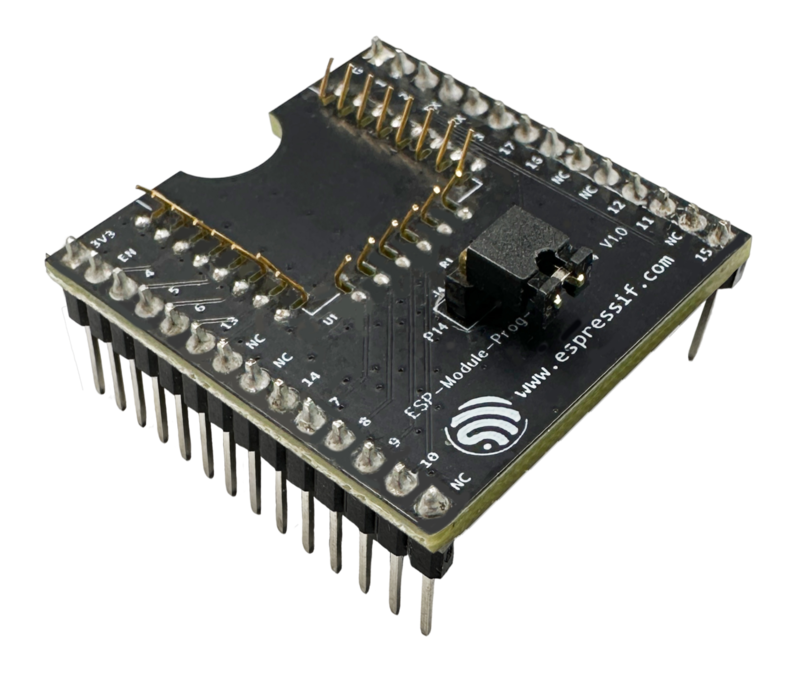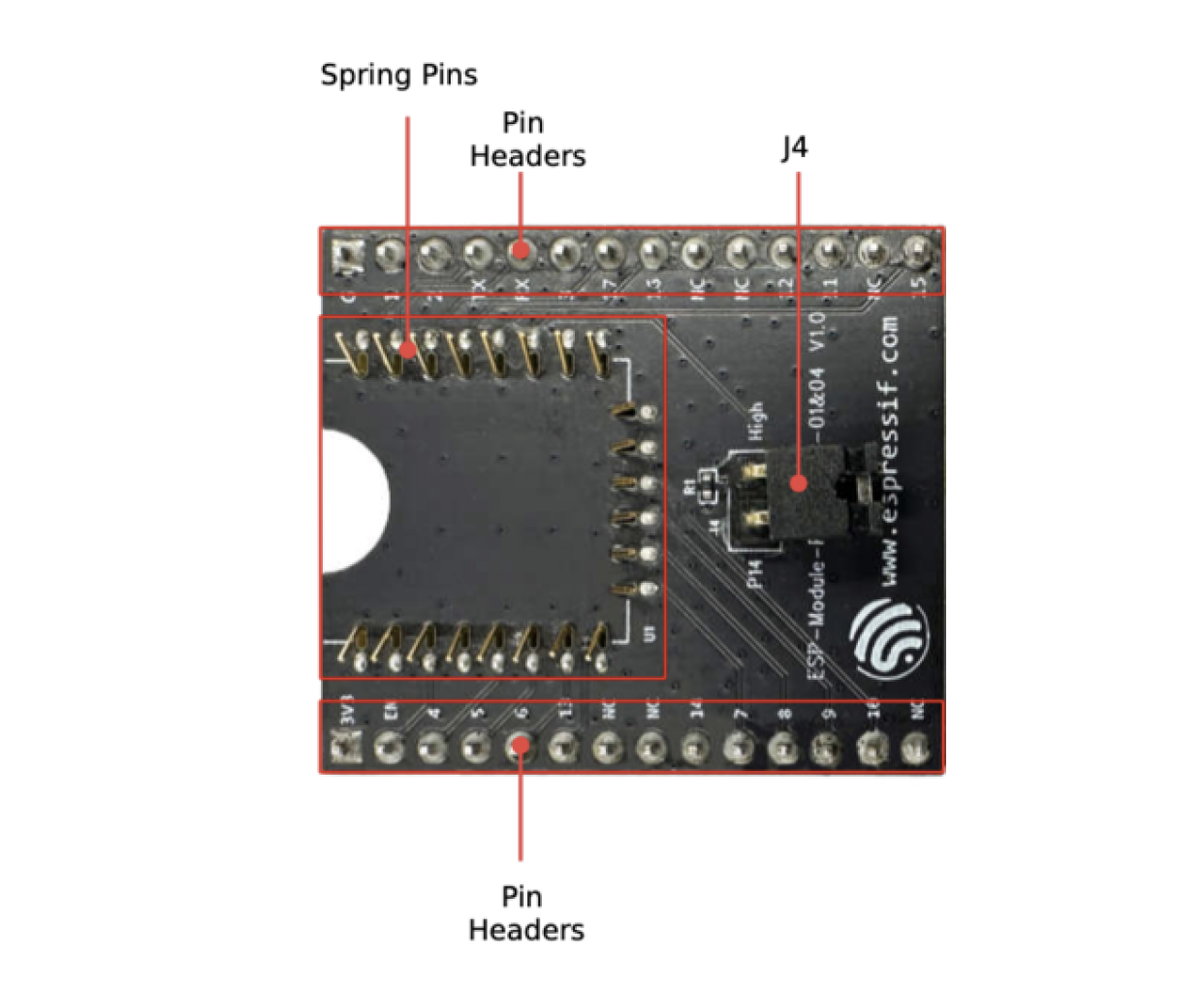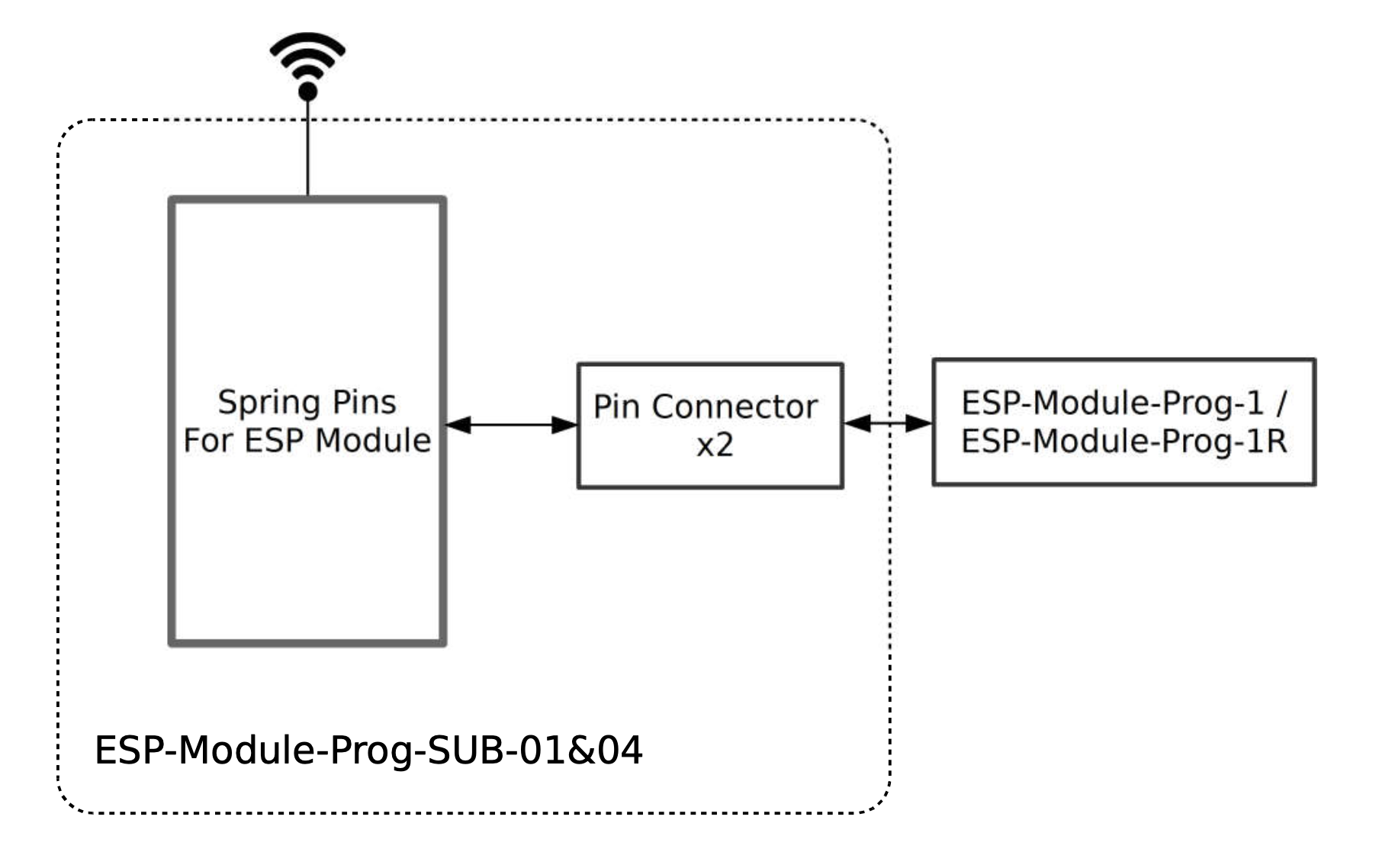ESP-Module-Prog-SUB-01&04
This user guide will help you get started with ESP-Module-Prog-SUB-01&04 and will also provide more in-depth information. For detailed information about the mainboard and the other subboard, please click the links below and check the corresponding user guides.

ESP-Module-Prog-SUB-01&04
This user guide consists of the following sections:
Board Overview: Overview of the board hardware/software.
Start Application Development: How to set up hardware/software to develop applications.
Hardware Reference: More detailed information about the board’s hardware.
Sample Request: How to get a sample board.
Related Documents: Links to related documentation.
Board Overview
ESP-Module-Prog-SUB-01&04 is an Espressif flashing subboard designed specifically for modules. It can be used to flash modules without soldering the module to the power supply and signal lines. With a module mounted, ESP-Module-Prog-SUB-01&04 can also be used as a mini development board like ESP32-DevKitC. Note that as a subboard, ESP-Module-Prog-SUB-01&04 cannot be used alone, but must be used together with the ESP-Module-Prog-1 or ESP-Module-Prog-1R mainboard.
- ESP-Module-Prog-SUB-01&04 fits the following Espressif modules:
ESP8685-WROOM-01
ESP8684-WROOM-01C
ESP8685-WROOM-04
ESP8684-WROOM-04C
For information about the above modules, please refer to Espressif Series Modules.
Description of Components

ESP-Module-Prog-SUB-01&04 - Front
The key components of the board are described in a clockwise direction.
Key Component |
Description |
|---|---|
Spring Pins |
Pins that fit into the module’s castellated holes for attaching and securing the module. |
Pin Headers |
2.54 mm pin headers that are connected to the pins of the module mounted in this board and to the mainboard. For detailed information, please refer to Section Pin Descriptions. |
J4 |
Configures the strapping pin. For details, please refer to Section Strapping Pin Configuration. |
ESP-Module-Prog-1(R) |
ESP-Module-Prog-1 and ESP-Module-Prog-1R (R stands for WROVER) are two flashing mainboards produced by Espressif. For detailed information about the mainboard, please refer to ESP-Module-Prog-1(R). |
Start Application Development
Before powering up your ESP-Module-Prog-SUB-01&04, please make sure that it is in good condition with no obvious signs of damage.
Required Hardware
Any one of the above-mentioned Espressif modules
USB-A to USB-C cable
PC (Windows, Linux, or macOS)
ESP-Module-Prog-1 or ESP-Module-Prog-1R mainboard
Note
Please make sure to use the appropriate USB cable. Some cables can only be used for charging, not for data transfer or program flashing.
Hardware Setup
Mount the module to the ESP-Module-Prog-SUB-01&04 subboard as follows:
Place the module lightly on ESP-Module-Prog-SUB-01&04, making sure the castellated holes on the module are aligned with the spring pins on the board.
Press the module inward until you hear a “click”, which indicates that the module has been successfully mounted.
Check if all the spring pins are clicked into the castellated holes. If there is a misalignment, you can use tweezers to poke the spring pins into the castellated holes.
Mount the subboard to the mainboard.
Now the board is ready for software setup.
Software Setup
Recommended Approach
It is recommended to use the ESP-IDF development framework to flash the binary file (*.bin) to ESP-Module-Prog-SUB-01&04. Please refer to ESP-IDF Get Started to get a quick overview of setting up your development environment and flashing applications.
Alternative Approach
For Windows systems, you can also use the Flash Download Tool to flash the binary files.
Note
To flash binary files, the chip should be set to Firmware Download mode. This can be done either by the flash tool automatically, or by holding down the Boot button and tapping the Reset button.
After flashing binary files, the Flash Download Tool restarts your module and boots the flashed application by default.
Hardware Reference
This section provides more detailed information about the board’s hardware.
Block Diagram
The block diagram below shows the components of ESP-Module-Prog-SUB-01&04 and their interconnections.

ESP-Module-Prog-SUB-01&04
Strapping Pin Configuration
J4 on ESP-Module-Prog-SUB-01&04 is a 2-Pin header, with one end being P14 and one end being High (i.e. pull-up):
For some modules, the corresponding pin of P14 is not a strapping pin and no pull-up is needed for downloading. In this case, a jump cap is not required for J4.
For some modules, the corresponding pin of P14 is a strapping pin and a pull-up is needed for downloading. In this case, a jump cap is required for J4.
Note
For the corresponding pin of P14 on Espressif modules, please refer to ESP-Module-Prog-SUB-01&04 GPIO Map.
ESP-Module-Prog-SUB-01&04 is currently fitted to ESP8684 series modules, where P14 needs to be pulled up. So, J4 requires a jump cap by default.
Pin Descriptions
The two tables below provide the Name and Signal of pin headers on both sides of the board (J2 and J3). The pin names are shown in Figure ESP-Module-Prog-SUB-01&04 - Front. The numbering is the same as in the ESP-Module-Prog-SUB-01&04 Schematics (PDF). For the corresponding pin of each signal on Espressif modules, please refer to ESP-Module-Prog-SUB-01&04 GPIO Map.
J2
No. |
Name |
Signal |
|---|---|---|
1 |
3V3 |
3.3 V power supply |
2 |
EN |
CHIP_EN (High: enables the chip; Low: disables the chip. Pulled up by default.) |
3 |
4 |
P4 |
4 |
5 |
P5 |
5 |
6 |
P6 |
6 |
13 |
P13 |
7 |
NC |
No connection |
8 |
NC |
No connection |
9 |
14 |
P14 |
10 |
7 |
P7 |
11 |
8 |
P8 |
12 |
9 |
P9 |
13 |
10 |
P10 |
14 |
NC |
No connection |
J3
No. |
Name |
Signal |
|---|---|---|
1 |
G |
Ground |
2 |
1 |
P1 |
3 |
2 |
P2 |
4 |
TX |
TXD0 |
5 |
RX |
RXD0 |
6 |
3 |
P3 |
7 |
17 |
P17 |
8 |
16 |
P16 |
9 |
NC |
No connection |
10 |
NC |
No connection |
11 |
12 |
P12 |
12 |
11 |
P11 |
13 |
NC |
No connection |
14 |
15 |
P15 |
Sample Request
Retail Orders
If you order a few samples, each ESP-Module-Prog-SUB-01&04 comes in an individual package in either antistatic bag or any packaging depending on your retailer.
For retail orders, please go to https://www.espressif.com/en/company/contact/buy-a-sample.
Wholesale Orders
If you order in bulk, the boards come in large cardboard boxes.
For wholesale orders, please go to https://www.espressif.com/en/contact-us/sales-questions.